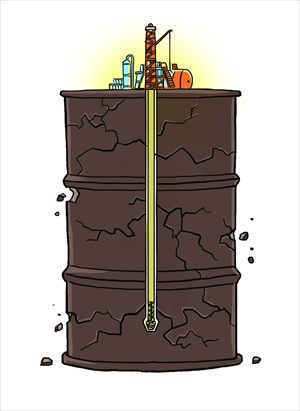Technological innovation is behind gas game-changer

Today, shale gas is viewed as a game-changer in US energy. While production of shale gas soared from 2 percent of total US dry gas production in 2002 to 23 percent in 2010, gas prices were pushed to decade lows, below $2 per million btu in April this year.
The impact seems widespread. Coal is relinquishing its reign over power generation to gas; the manufacturing industries advocate for their potential renaissance; and more importantly, Americans are starting to look at their energy situation through a different lens: that they are becoming energy independent, and could even become another Saudi Arabia in a decade.
Such a dramatic turnaround has drawn great interest from around the world, especially from China, which is thought to be sitting on the largest shale gas reserves in the world. One may wonder: Can China replicate the US shale gas revolution?
Several interesting aspects of the history of US shale gas development may provide some insight for China.
Technological innovation is central to the shale gas revolution. Hence, the right question to ask is: What drives technological innovation?
One may be amazed by the lack of a unified technology path regarding shale gas innovations. Instead, the technologies are headed in diverse and sometimes competing directions.
For sure, the competing technologies are supported by competing companies. At the turn of the 1900s, there were already a handful of integrated companies, hundreds of independent upstream producers, as well as 100 or so service companies.
This industry structure has continued to this day, with small producers estimated to account for 85 percent of natural gas production and 60 percent of oil production in the lower 48 states in 2009.
The competitive market structure is mainly guarded by two legal pillars. One is anti-monopoly laws. A monumental 1911 US Supreme Court decision ordered the Standard Oil Trust, a monopoly created by John D. Rockefeller that controlled 90 percent of oil refining and 80 percent of oil transport markets in the US, to dissolve into seven regional companies based on violations of the Sherman Anti-Trust Act adopted in 1890.
The separated companies are known today as Exxon Mobil, BP, ConocoPhillips and ChevronTexaco. The 1911 decision did not eliminate industry giants, but ensured that they at least competed with one another.
The other is patent protection. Small companies depended on patents to make their fortune, which would typically last 20 years, after which the content would be made public.
For example, the inventor Edward Roberts filed a patent in 1866 for using gunpowder as hydrofracturing material, which was later litigated at least twice but was upheld.
Given the competitive market structure, companies constantly sought technical and economic advantage over one another, pushing technology still further.
While some prevailed, others died. The opportunity to fail, as much as to succeed, is perhaps the essence of the Anglo-Saxon market system.
Amid the oil crisis in the mid-1970s, the US government launched several fossil energy R&D programs that eventually spanned three decades. Moreover, beginning in the mid-1990s, the US Department of Energy initiated a series of programs that provided research stimulus to small producers. The oil and gas industry would not have turned serious attention to shale gas without such effective and consistent government support.
Most federal and state laws in the US require well operators to report oil and gas production data on a regular basis. Such transparent data sharing has significantly promoted knowledge transfer and the overall pace of shale gas development.
In sum, a few fundamental principles can be drawn from the US experience: Technological innovation is driven by fair market competition, smart government intervention, and robust regulatory capacity.
For China, which has a vastly different business, political and cultural environment from the US, these principles may remain valid.
The author is a researcher at the Energy Security Initiative of Brookings Institution. opinion@globaltimes.com.cn